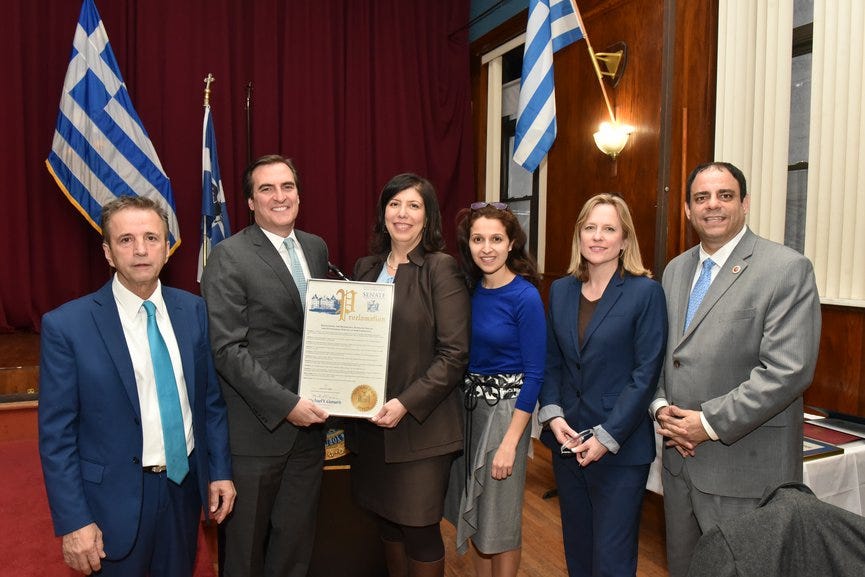The Right-Wing Prosecutor Democrats Just Put on New York's Highest Court is also a Landlord
Her family owns rental properties throughout Western Queens, including a rent-stabilized apartment building in Ridgewood.
(Left to Right: former assemblywoman Aravella Simotas, State Senator Mike Gianaris, Justice Madeline Singas, Councilman Costa Constantinides.)In 2018, New York Democrats recaptured the State Senate from Republicans and purged a collaborationist right-wing faction within their own ranks, bringing the state under one-party control for the first time in decades. Vowing a progressive revival, Senate Democrats passed a raft of reform measures in 2019, including the Housing Stability and Tenant Protection Act, which strengthened tenants’ rights in New York. Though leadership continues to reject a more radical housing agenda, such as good cause eviction legislation, the HSTPA was still a major improvement to New York’s traditionally pro-landlord rental regime.
Its grip on Albany having slackened ever so slightly, capital then turned to the courts to enforce its prerogatives, filing a series of state and federal lawsuits to quash the legislation. They scored their first victory in April 2020 when the Court of Appeals, the highest state court in New York, threw out a provision mandating heavy penalties for landlords who illegally overcharged tenants on rent. The 4-3 decision revealed that although the legislature’s most conservative elements had been chastened, the judiciary remains an enclave of reaction, packed with pro-business justices appointed by Governor Andrew Cuomo.
In November 2020, Leslie Stein - one of the four justices who had sided with the landlords - announced her retirement, set to take effect in June of this year. As expected, Cuomo’s choice for her replacement was appalling. Madeline Singas was the District Attorney of Nassau County and had built her career on a legacy of mass incarceration. As a young prosecutor in Queens, she withheld evidence that would have exonerated three men falsely accused of murder, who spent decades in prison due to her actions. As Nassau DA, she was a vocal critic of New York’s 2019 bail reform laws, and trained her prosecutors on how to subvert them.
Though she was nominated just over two weeks ago, Madeline Singas is already sitting on the Court of Appeals. Despite this record of open antagonism toward their own alleged priorities, Senate Democrats rammed her confirmation through in the final days of the legislative session against furious objections from criminal justice reform advocates. But they aren’t the only ones who should be disturbed. While much has rightly been made of Singas’ pro-carceral views, she’s also the landlord of a rent-stabilized apartment building, a fact that is especially relevant in light of the ongoing campaign against the HSTPA in the courts.
Madeline Singas’ parents purchased a property at 23-63 24th Street in Astoria back in 1966, when the family relocated to Queens from Worcester, Massachusetts, where Singas was born. After their father died in 2012, Singas and her sister Effy inherited the property and operated it as a rental. Although it’s zoned for a two-family building, in 2018 the city received a complaint from someone suspecting that the property owner had undertaken an illegal conversion and was renting the basement out as a third unit. Inspectors visited the property three times in June and July of 2018. Twice, no one answered the door; a third time, a woman answered but denied the inspector entry to the building.
In September 2019, Singas and her sister transferred the property to an LLC registered at the sister’s address on Long Island. The only signature appearing on the transfer document on behalf of the LLC is that of Effy Singas, suggesting she now possesses sole legal ownership. However, there’s no way to tell from these records whether or not Madeline Singas is still benefiting financially from the property, or how she and her sister divided the rental income as their former home passed through its various ownership arrangements.
Still, there’s no question that Singas does benefit from other streams of rental income. Her husband, Theo Apostolou, owns a number of rental properties throughout Western Queens. Little public information is available about Singas’ husband or his business activities. When asked about him in an interview with a Greek-American magazine in January 2020, Singas replied vaguely: “He’s in sales. Successful businessman.” Together for over 25 years, Singas and Apostolou were living at the Singas family home in Astoria when they purchased a property in Manhasset, Nassau County back in 2000. Their Manhasset address is shared by an LLC that is the legal owner a six-unit, rent-stabilized apartment building in Ridgewood, Queens.
Property records show that Apostolou and another man, Peter Conelias, purchased 583 Seneca Avenue in 2013. In 2017, the property was transferred to an LLC of the same name, registered at Singas and Apostolou’s home in Manhasset. Only Apostolou’s signature appears on the transfer documents on behalf of the LLC and on a refinanced mortgage granted to the LLC that same year, suggesting he may now be the property’s sole owner. According to the Displacement Alert Project, all six units in the building were rent stabilized as of 2014, but by 2016, three units had gone market rate. Public records also show that Apostolou, Conelias, and a woman named Vasiliki Orsaris purchased 214-10 23rd Avenue, a two-unit property in Flushing, in 1998; all three refinanced the mortgage on the property in 2009.
Peter Conelias is the brother of Thomas Conelias, who is Theo Apostolou’s brother-in-law. Thomas is married to Theo’s sister, Ntina Apostolou. Thomas Conelias is also a longtime official with the International Brotherhood of Teamsters. Beginning in 2000, he served as president of IBT Local 851, until it merged with IBT Local 295 in 2010 in an attempt to shore up the locals’ precarious financial positions. Thomas Conelias stayed on as a Vice President following the merger before leaving for a gig with the national union in 2014. The two locals have a fascinating history; representing airport workers, for many years they conspired with the Lucchese crime family to extort the companies that own the billions of dollars’ worth of cargo that passes through JFK every year. In the late 1980s and early 1990s, the locals were placed under court-appointed trusteeship after their leaders were imprisoned on federal racketeering charges, dealing a blow to the mob’s influence over air shipping in New York.
That’s all in the past of course, but still an interesting bit of trivia! More relevant to this discussion is the fact that Vasiliki Orsaris worked as an office manager at Local 851 beginning in 2005, at the same time as Thomas Conelias. She stayed on following the merger with Local 295 and still works there as a bookkeeper. Presumably, Peter Conelias met her through his brother, and at some point they decided to enter into this real estate transaction with Theo Apostolou.
In other words, it’s not just Singas’ immediate family that benefits from rental income. Many members of her extended family and their longtime acquaintances do as well. The two families also seem to have a good relationship. Together, Thomas and Peter Conelias gave Singas $4,400 in cash over the course of her two runs for Nassau County DA. Thomas Conelias gave a further $4,300 worth of in-kind contributions. Certainly, these aren’t staggering sums. It merely suggests that the personal incentives for Singas to rule favorably towards landlords range from her own family’s financial interests to those of more distant relatives and friends with whom she enjoys cordial relations.
These facts might have come to light earlier if Nassau County made its elected officials’ financial disclosures available online, as the state government does for its electeds. Instead, members of the public wishing to view these documents must file a request under the state’s Freedom of Information Law. Jawdroppingly, Nassau County only adopted an electronic filing and request system for financial disclosures in 2019; before that, even members of the county’s Board of Ethics had to file handwritten requests to view these documents, which were maintained only on paper. After the electronic system was implemented, the local press asked why the county didn’t just put it online. County Executive Laura Curran replied that merely leaving the analog age was “an important step.” If that doesn’t reassure you, neither will the fact that the legal mastermind behind this bloodless initiative was Madeline Singas. No doubt her commitment to transparency as a judge will be just as forceful as it was as DA.
But the truth is that nothing could likely have stopped Singas’ confirmation. Not only was Cuomo determined to seat her, she had powerful allies within the Senate Democratic Conference, including Deputy Majority Leader Mike Gianaris. The word on Steinway Street is that Gianaris was a major booster for Singas throughout the confirmation process, owing to their connection through Astoria’s Greek community. The photograph that opens this article is from the Pancyprian Women’s Initiative Network annual gala in 2018. Here they are again celebrating Greek Independence Day that same year:
Singas received such ferocious pushback from criminal justice advocates that when it finally came time for her confirmation vote, Gianaris initially attempted to conduct a voting procedure that would have required only Senators wishing to vote nay to record their voting intention. In other words, no one would have to actually “vote yes” on confirming Singas. Republican Senators objected on the Senate floor for 10 minutes straight before Gianaris finally relented. You can watch the whole episode play out from 2:17:38 to 2:28:10 in this video.
Cuomo wanted her. Gianaris wanted her. And now we’re stuck with her. I asked Ellen Davidson, a staff attorney at the Legal Aid Society specializing in housing issues, what her view was of Singas’ confirmation. She said that she’s relieved all the current challenges to the HSTPA are in federal court, where Singas will not have the chance to rule on them, and that it’s “scary that we now have a rent-stabilized landlord on the bench.” But she added that landlords are trying to come up with legal strategies to make the HSTPA’s provisions prospective as opposed to retroactive, and that future cases are likely to come before state appellate courts in this effort. Given that justices on the Court of Appeals serve 14-year terms, Singas will almost certainly rule on tenants’ issues during her tenure. Less certain is whether it’s better or worse if she’s thinking about her own tenants when she does.





